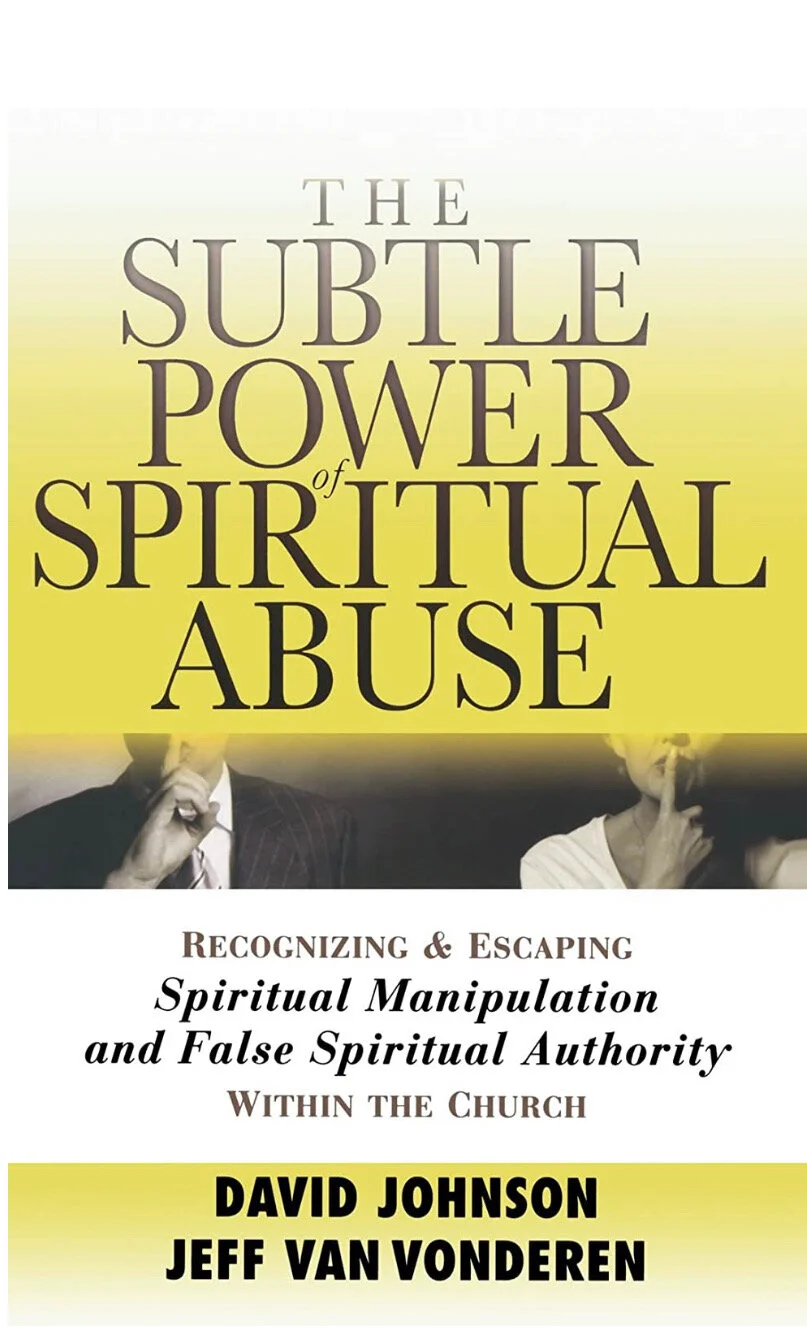The Subtle Power of Spiritual Abuse
David Johnson & Jeff VanVonderen
This book is a great reference that breaks down commonly misapplied and often abused passages such as,
1 Peter 3:1-2 (wives submit to your husbands)
Matthew 18:21-22 (forgiveness)
A book like this can be used as a pocket guide for understanding and recovery.
Here’s a brief overview of some of the passages the book discusses.
1 Peter 3:1-2 (wives submit to your husbands)
An example of a way this passage has been misapplied is when it’s used to prevent a woman from leaving an abusive marriage, or, at the very least, speaking up and holding her husband accountable. The writers break down the context, revealing how the verses appear in a setting which holds all humans to a high standard. This part about submitting to a husband, does not preclude a battered wife from pointing out and responding to the evil actions of her spouse—even if that means separating from him in order to call him to account.
The passage also speaks about setting an example for her children, yet allowing her children to be exposed to abuse is deliberately placing them in the company of unhealthy relationships.
In California (where I live), if a child witnesses a mother’s abuse, the mother is held equally responsible for child abuse (alongside the abusive partner), because she allowed her child to witness and be exposed to abuse. She did not remove her children from an abusive situation, therefore she is held accountable for the abuse, even if she was not the overt abuser. The wife’s responsibility to “respect” her husband does not supersede her responsibility to protect her children.
These are my words (not taken from the book), but often this passage (along with Ephesians 5) is held up as the only passage a wife needs to understand and follow. Often in Spiritually Abusive marriages, it is believed, as long as she follows this command, she can ignore the rest of the Bible. Her relationship as wife is considered the only relationship that matters, and her relationship as a fellow human, worthy of decent treatment, is ignored.
Matthew 18:21-22 (forgiveness)
This is the portion of scripture where Jesus responds to Peter’s query on how often he needs to forgive someone. Jesus responds “seventy times seven” indicating not a number or a formula but a suggestion there is never a limit to our forgiveness. Yet this is not a command to go out and “try harder” or to pretend we’ve forgiven when we really haven’t. It’s an invitation to know it is difficult and impossible, therefore we need something, someone, outside ourselves for us to forgive from our hearts.
In this same passage, a three-step process is given for confronting someone on their sin, and, if they don’t turn away from their sin, letting that person be who they have chosen to be and treat them accordingly. We are not “cutting them off” so much as allowing them to live with the consequences of the life they have chosen.
I’ll add my own words again: an example of misapplication of scripture is when “forgiveness” is held up as more important than the other parts of scripture. The very fact these verses on forgiveness fall within the context of guidelines for separating from someone who is unrepentant, demonstrate forgiveness does not mean pretending as if the harm never happened.
It is not graciousness towards an abuser to allow them to continue abusing. It is not grace for the abuser to allow that person to be exposed to the same situation in which they were abusive (i.e. allowing an abusive pastor to continue pastoring, allowing an abusive father to continue parenting, allowing an abusive husband to remain unchecked in his marriage, allowing an abusive system to remain unchallenged). This isn’t grace, forgiveness, or love. It’s insanity.
The book breaks down many other passages and how they are misapplied. It discusses abusive situations where a pastor claims authority and resists anyone questioning his decisions by saying, “I am the pastor, that’s why.” It addresses religious systems that penalize someone for pointing out a problem, treating that person as if they are the problem, when all they did was draw attention to it. It discusses Bible verses that are used to cover up and hide sin, when this is, in fact, the opposite of what is known as the gospel.
I chose to highlight the above set of verses because I have had to debunk them for myself and others on many, many occasions, and I felt the authors gave great explanations of how they have been mis-used and abused.
This book is in The Vault, and is a great primer for understanding and defying Spiritual Abuse.

